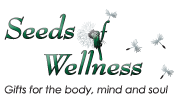- 440-933-7733
- 33501 Lake Rd., Suite H, Avon Lake, OH 44012
- Mon: 12:00 - 6:00 pm, Tue - Fri: 12:00 - 7:00 pm, Sat: 12:00 - 5:00 pm
Skincare Products
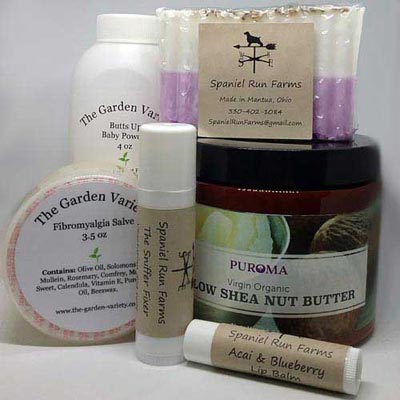
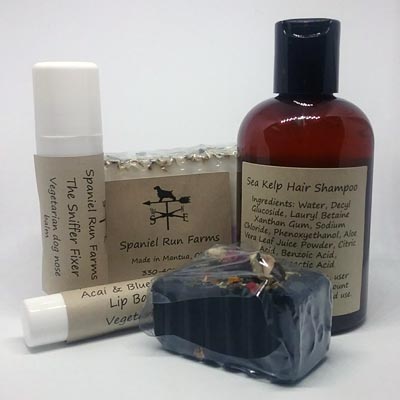
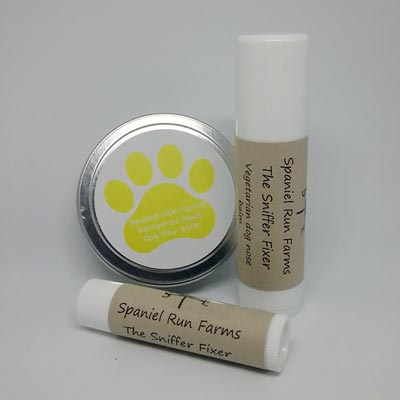
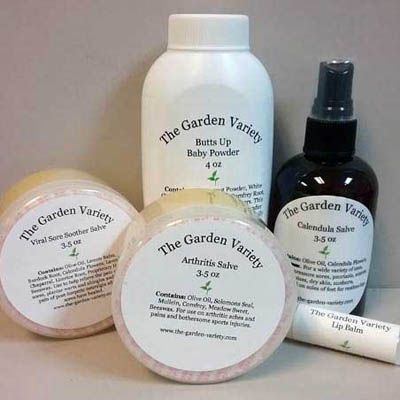
Are you looking for natural skincare products? Seeds of Wellness offers handmade natural skin care items.
The Garden Variety – 100% natural skincare products free of parabens, phthalates, laurel/laureth sulfates, talc, and cornstarch
- Lip balm
- Healing salves – calendula, comfrey, fibromyalgia, fungout, and viral sore soother
- Natural powders – butts up baby powder, fragrant feet foot powder, and good for the girls anti-yeast powder
Spaniel Run Farms – vegetarian and vegan skincare products made with essential oils
- Lip balm
- Animal paws salve
- Lotion
- Hair products
- Soap – bar and liquid
Difference between Commercial and Handmade Bar Soap
There are many varieties of bar soap, but not all bar soap is the same. There are major differences between commercial and handmade soaps. The differences begin with how the soap is made and the additives to the soap before it becomes a solid bar.
Making Soap
Soap is made from fats, oils, and lye. Most soap are made with the cold process method: heating the fat or oils, slowly adding lye and water mixture until it thickens, adding fragrance and color and then pouring the liquid into molds. The soap is removed from the molds once hardened, about 24 hours. After it has cured for about four weeks, it is safe and ready for use. During the soap making process, the added lye is neutralized by the chemical reaction that turns the fat and lye into soap.
Commercial Bar Soap
Much commercial soap is made using the cold process method. However, instead of pouring the liquid into molds once it thickens, they add salt to the mixture. The salt causes the liquid to curdle. The curdled soap floats to the top and is skimmed off the liquid to put into molds. The remaining liquid is mainly glycerin which is distilled and sold to pharmaceutical and cosmetic companies to make a profit.
By removing the glycerin from the soap, the bar soap is more like a detergent. A detergent is a surfactant that helps water and oil to combine instead of separating. This allows a surface to be cleaned with water even if the surface contains oil. Skin contains oil which is removed when a detergent is used. Therefore, commercial bar soap dries out the skin because it remove the skins natural oils that provide the body protection from weather, viruses, bacteria and other disease causing substances.
In order for commercial bar soap to provide more moisturizing than drying to the skin, other ingredients need to be added to the soap like lotion and cream. Many commercial soap ads say “it won’t dry your skin” because they added moisturizers. These additives also contain many harsh chemicals and chemical preservatives.
What Is Glycerin?
Fats (both vegetable and animal) contain glycerin. It is a thick odorless and colorless sweet tasting and low toxicity liquid that is an ingredient in foods, medication, soap, antifreeze and other products.
Glycerin is known for its main property, humectant, the retaining of water. When glycerin stays on the surface of the skin, it helps seal the moisture in the skin because the moisture cannot be released into the air.
Glycerin is also hygroscopic, meaning it absorbs moisture from the air. Therefore, it draws water to the skin from the air which increases the amount of moisture in the skin.
Handmade Bar Soap
People who make soap can buy unscented glycerin bars or soap bars that they melt down and add their own fragrance and color to the liquid and then put into molds. However, the amount of glycerin in the soap depends on how much is contained in the initial bar soap being melted down. If the soap is made from scratch, most are made using the cold process method.
When the soap bars are made from scratch, the glycerin remains in the soap, and the artisan can choose to add natural or artificial fats, oils, fragrances and colors to the final product. While the handmade soap may not last as long as the commercial soap, it doesn’t contain as many chemical preservatives or other harsh chemicals.
As a consumer, you need to look at the ingredient list of any soap you purchase, even the handmade soap. The ingredient list of a natural handmade soap shouldn’t contain chemical names like Sodium Lauryl Sulfate (SLS) and Sodium Laureth Sulfate (SLES) or artificial colors like blue number 1.
Sources:
- “How to Make Bar Soap Yourself” on healthline.com
- “What Is Glycerin? Benefits, Uses and Side Effects for Skin Health” By Annie Price, CHHC on Dr. Axe
- “Is Handmade/Natural Soap Better than Commercial Soap?” on alo GOODS
